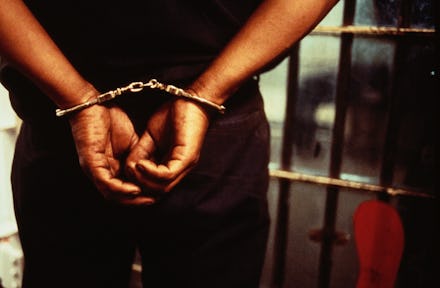Turns Out Telling White People About America's Racist Prison System Actually Backfires

White people seem to believe that more black prisoners is a sign of an effective criminal justice system, even when they have the racial inequalities of that system waved in front of their noses.
That's according to a new study out of Stanford University, that tested how increasing white people's awareness of disproportionate incarceration rates for whites and blacks would affect their views on incarceration laws. Two experiments, one conducted in San Francisco and the other in New York City, showed white subjects a series of mug shots. Those who saw more black faces among the mug shots were less likely to sign petitions advocating prison reform.
Of the joint study, Stanford researcher Rebecca Hetey concluded, "Many legal advocates and social activists seem to assume that bombarding the public with images, statistics and other evidence of racial disparities will motivate people to join the cause and fight inequality. But we found that, ironically, exposure to extreme racial disparities may make the public less, and not more, responsive to attempts to lessen the severity of policies that help maintain those disparities."
It seems that when it comes to racism and the prison system, honesty may not always be the best policy.
Image Credit: AP
The study's outcome may very well have significant ramifications for activists trying to change the criminal justice system. Current strategy tends to employ logic: Institutionalized racism is evident in the structures of society, one of which is the prison industrial complex. The sheer fact that 40% of the nation's prison population is black — nearly four times the percentage of the entire population — is statistical evidence that the criminal justice system disproportionally affects, if not targets, the black community.
Yet Hetey and Eberhardt seem to have proven that activists should consider inverting their strategy. "Our research shows that numbers don't always speak for themselves," Jennifer Eberhardt noted. "Reducing inequality takes more than simply presenting people with evidence of extreme inequality."
One might argue that this shocking result is the product of the psychology of racism, a domain in which rational science and statistics hold less influence. Hetey and Eberhardt's study suggests that the more black faces a white person sees in a mug shot sequence, the more likely that white person believes not that the criminal justice system is racist, but that all those black faces are proof that black people are guilty. It's a perversion of the "colorblind" viewpoint, that surely these black faces are incarcerated because the criminal justice system would never incarcerate innocent people.
This implied societal blindness when it comes to institutional racism dovetails nicely with an earlier study by two psychologists at Northwestern University investigating how white people react to the possibility of losing their majoritarian status.
"On the Precipice of a 'Majority-Minority' America: Perceived Status Threat from the Racial Demographic Shift Affects White Americans' Political Ideology" by Maureen A. Craig and Jennifer A. Richeson proved that when a racial majority believes that its majority status has been threatened, there is a correlative uptick in the amount of fear and loathing directed at the racial group perceived to threaten that status.
The Stanford study, one might argue, is an extension of this point. Instead of seeing racism, the study subjects saw a way to shore up their majority status. Either way, it's not very encouraging news for prison reform advocates in the United States.